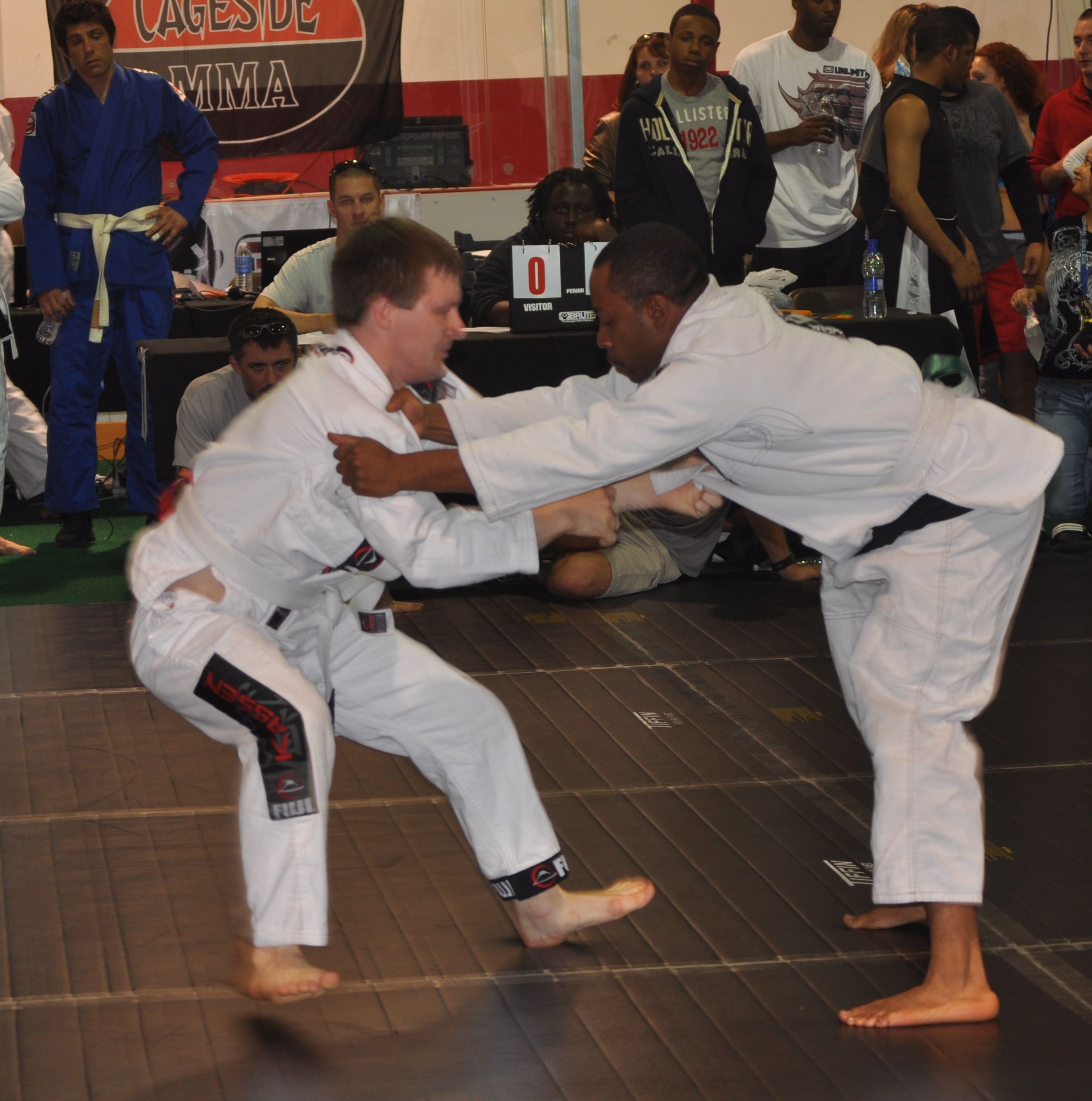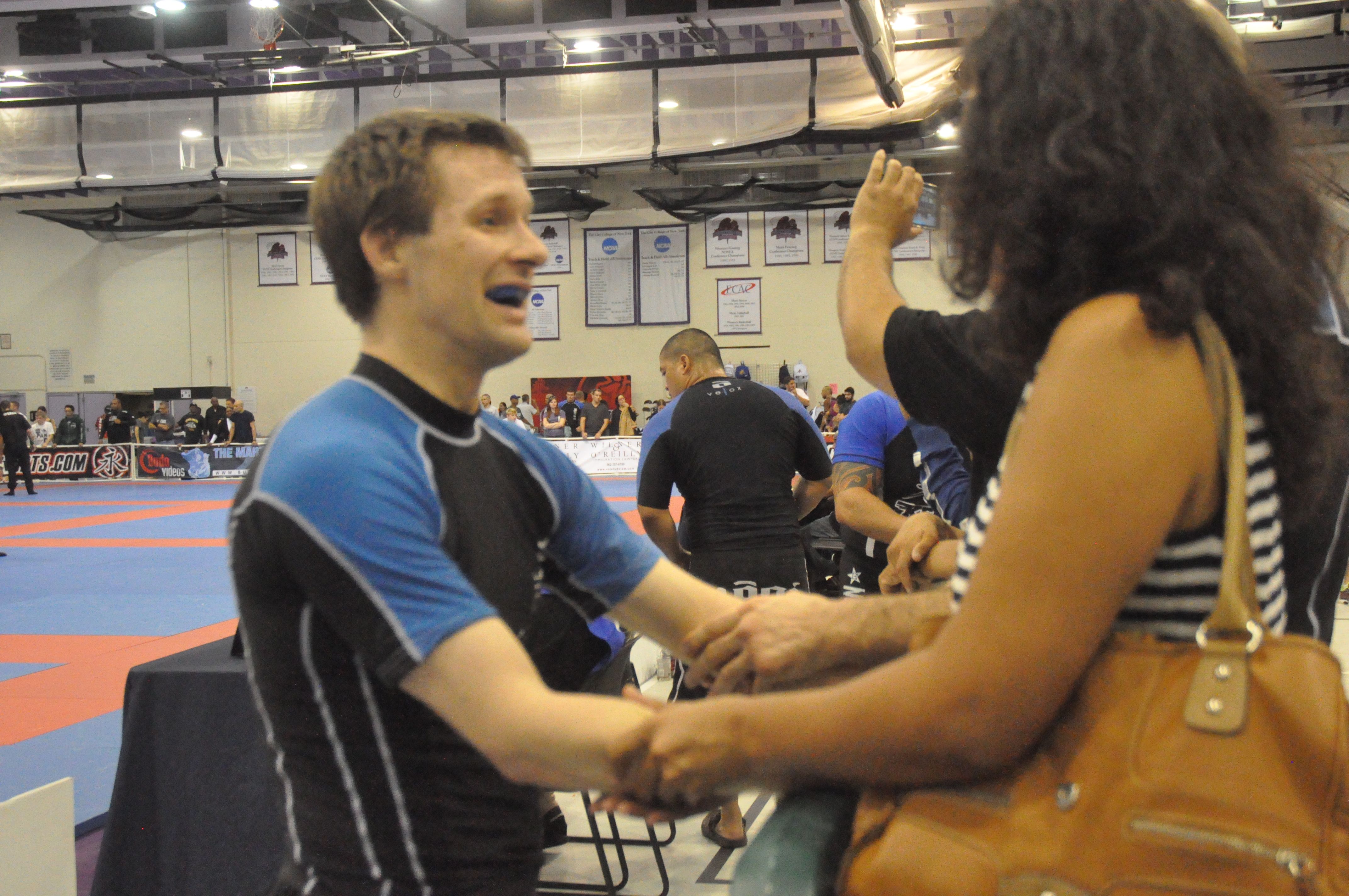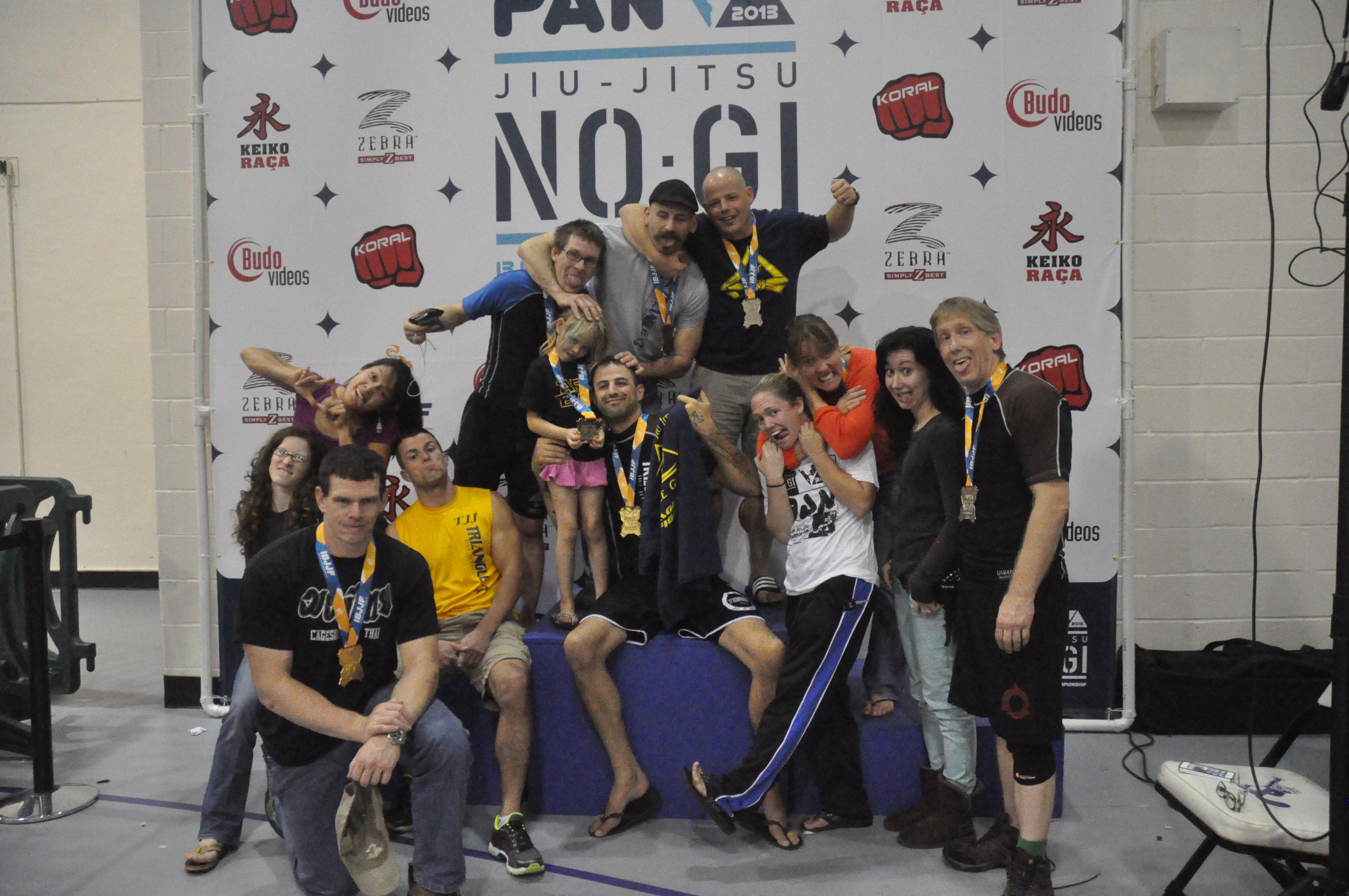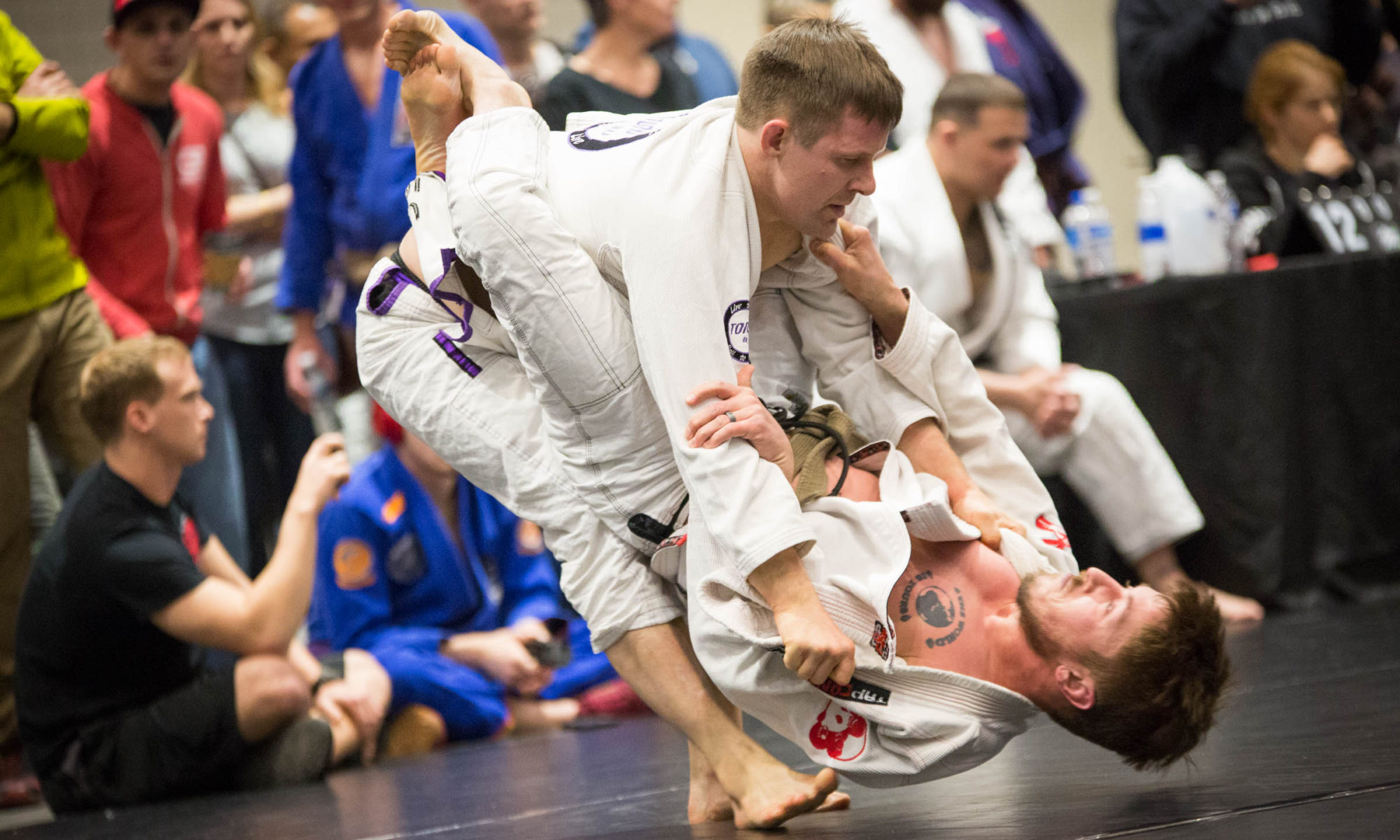This weekend is US Grappling’s first tournament of the year, Submission Only Greensboro, which always gets the new folks asking: is it too early for me to compete?
I’ve had a couple of these questions already, so I wanted to explain my own philosophy on this. It’s different for every person (more on that below), but here are the general principles I start from.
1. Competition Is Very Valuable Experience For Everyone.
Even if you don’t plan to be a regular medal hunter, I think you — and everyone — should give a tournament a shot.
It’s a different intensity from daily sparring, and it’s hard to find that intensity elsewhere. It gives you the opportunity to roll against people that you know nothing about, so you can’t predict what techniques are likely to come at you. And it gives you the chance to set a goal, train hard for it, and go all-out for victory once the day comes. That’s great training!
Take it from the great Royler Gracie: everyone should compete at least once.
[youtube=http://www.youtube.com/watch?v=hmk0SnJCsq8]
Apart from the standard benefits of competition, consider this: your training partners probably like you. Unless you are a jerk, but if you are reading this blog, then you are not a jerk. That means even if you roll hard, like we do at my academy, they are probably trying to be technical when rolling with you and avoid doing overly terrible things to you.
My training partners are very technical, have great cardio, and are relentless. We roll hard against each other. But if I get a collar grip and there’s hair in there, I’m not going to keep my grip and pull that person’s hair. If someone gets a choke on me, but it’s not a clean choke and they can’t finish, that person is probably not going to just facecrush me and give me gi burn.
… probably.
Where medals are at stake, though? Against someone who doesn’t know you? All bets are off. Facing off against someone who has no stake in you personally, knowing that person is trying to choke you or bend your joints the wrong way — and surviving that — is a powerful thing.
When a match ends, you know that person has done their level best to beat you up. And you made it out the other side. Competition gives you that satisfaction.
2. Have The Right Attitude About Competition
Especially during the first stages of your jiu-jitsu career, you’re there to learn. Period.
Thus, I don’t generally think new people should put tremendous pressure on themselves to win when competing. Don’t misunderstand me: You should always go out there with the goal to win every match, and the attitude that you’re going to win every match.
But you should also be able to put the tournament in perspective. If you lose every match, you’ve still gained valuable knowledge and experience. Now you know what it’s like to be around the hustle and bustle of a tournament, make weight, hear someone shout your name and push you out onto a mat to grapple against someone you don’t know.
That’s a huge win for you, even if you enter four divisions and go 0-4. Very few people compete their best during their first tournament. Getting the first one out of the way is a big step.
3. In General, People Should Compete As Early As Possible …
Don’t get me wrong, I don’t think you should register for the Pans after your second class. But assuming you know one or two things to do from the major positions, I say go for it.
Personally, I competed very early on — my first tournament was after I had trained for a month. I think that was good for me. I won some matches, I lost some matches, I made some cringe-worthy decisions that I look back on with laughter, and I learned a lot of things not to do. And I was hooked.

This part is significant: I don’t even notice the hustle and bustle and excitement of tournaments anymore. After that first one, I started competing as often as possible.But I had a huge adrenaline dump after my first match at my first tournament, and wow, was I unprepared for that. It can be overwhelming your first time.
Yes, I have video of that match. No, you can’t see it.
That doesn’t happen to me any more, and I’m glad it happened a month in instead of a year in. Getting your first time out of the way early on means you’ll be all the more ready for the next one.
4. … But If You Don’t Feel Ready, It’s Better To Wait.
I always tell people that if they have any doubts about whether they’re ready for the experience, they should wait to compete. Feeling comfortable is important! This is what you do for fun, so you should enjoy it. Being unsure if you’re ready isn’t fun.
Now, there is a balance to be struck here. Everyone gets nervous, and it’s easy to find an excuse. How many people tell you they’re going to start training “as soon as they get in shape,” and then never get in “good enough” shape?
Part of the value of competition is challenging yourself to get out of that comfort zone. It’s hugely empowering to feel overwhelming nerves, to not be sure you should even be doing something, and then come out the other side.
Here’s how I resolve the balance. Anything that keeps people training is a good thing, in my view. If a competition risks robbing someone of the joy of training, that’s too early. So if you feel like you can handle losing, and it won’t discourage you, I say go for it.
As long as you enjoy yourself, you’ve won, even if you’ve lost every match.
5. Competition Gives You The Individual And Team Experience
You step out on the mat alone. No one is going to take that guy down for you, pass his guard, or choke him for you.
But you’re not alone. You didn’t train alone. You aren’t at the tournament alone. Your coach can’t armbar your opponent, but he or she can tell you where to move your leg so that you can do it yourself. And your team, if it’s anything like mine, will scream their heads off for you. Or, when your muscles are spasming right before the semis of absolute, they might even massage your forearms for you.

Why do I mention this? Because I believe jiu-jitsu competitions give you the best of both worlds. You get both the individual competition experience and the team experience. If you stink up the joint, like I did at the Pans in 2012, you still get to root for your friends and be thrilled when they medal.
If you do well, all the better. You stepped on the mat by yourself and did something most people will never do. Then you stepped off the mat and got mobbed with support by the people you train, sweat and occasionally bleed with.

It’s a special experience. And you can have it! So set a goal for when you’re going to compete, train hard for it, and remember: no matter what happens, you’ll have won by the end of the day.

One Reply to “How Early Should I Compete?”
Comments are closed.